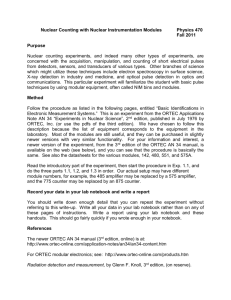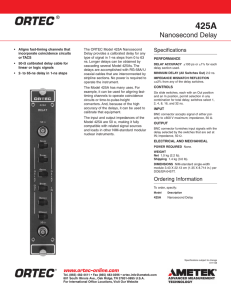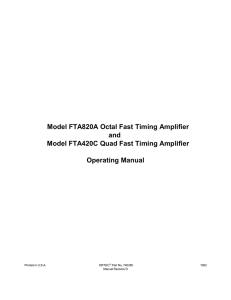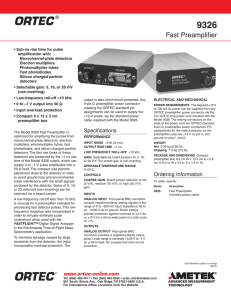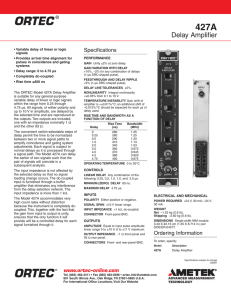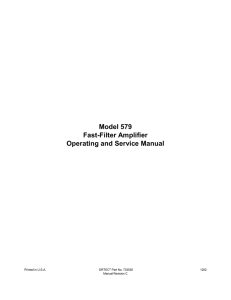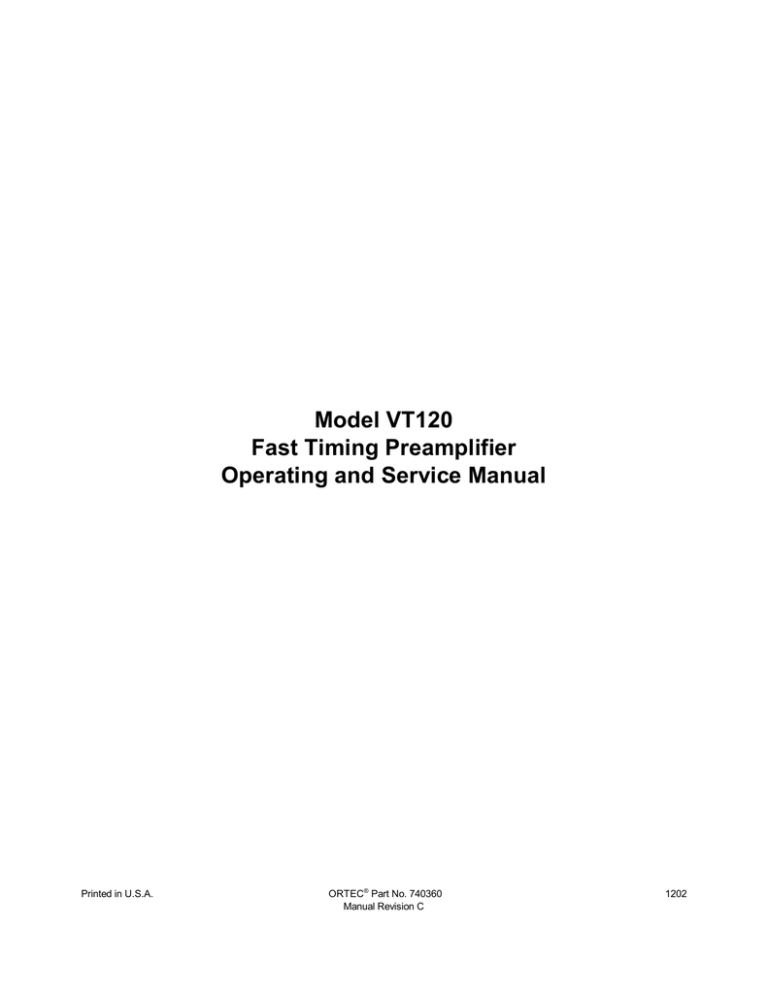
Model VT120
Fast Timing Preamplifier
Operating and Service Manual
Printed in U.S.A.
ORTEC® Part No. 740360
Manual Revision C
1202
Advanced Measurement Technology, Inc.
a/k/a/ ORTEC®, a subsidiary of AMETEK®, Inc.
WARRANTY
ORTEC* warrants that the items will be delivered free from defects in material or workmanship. ORTEC makes
no other warranties, express or implied, and specifically NO WARRANTY OF MERCHANTABILITY OR
FITNESS FOR A PARTICULAR PURPOSE.
ORTEC’s exclusive liability is limited to repairing or replacing at ORTEC’s option, items found by ORTEC to
be defective in workmanship or materials within one year from the date of delivery. ORTEC’s liability on any
claim of any kind, including negligence, loss, or damages arising out of, connected with, or from the performance
or breach thereof, or from the manufacture, sale, delivery, resale, repair, or use of any item or services covered
by this agreement or purchase order, shall in no case exceed the price allocable to the item or service furnished
or any part thereof that gives rise to the claim. In the event ORTEC fails to manufacture or deliver items called
for in this agreement or purchase order, ORTEC’s exclusive liability and buyer’s exclusive remedy shall be release
of the buyer from the obligation to pay the purchase price. In no event shall ORTEC be liable for special or
consequential damages.
Quality Control
Before being approved for shipment, each ORTEC instrument must pass a stringent set of quality control tests
designed to expose any flaws in materials or workmanship. Permanent records of these tests are maintained for
use in warranty repair and as a source of statistical information for design improvements.
Repair Service
If it becomes necessary to return this instrument for repair, it is essential that Customer Services be contacted in
advance of its return so that a Return Authorization Number can be assigned to the unit. Also, ORTEC must be
informed, either in writing, by telephone [(865) 482-4411] or by facsimile transmission [(865) 483-2133], of the
nature of the fault of the instrument being returned and of the model, serial, and revision ("Rev" on rear panel)
numbers. Failure to do so may cause unnecessary delays in getting the unit repaired. The ORTEC standard
procedure requires that instruments returned for repair pass the same quality control tests that are used for
new-production instruments. Instruments that are returned should be packed so that they will withstand normal
transit handling and must be shipped PREPAID via Air Parcel Post or United Parcel Service to the designated
ORTEC repair center. The address label and the package should include the Return Authorization Number
assigned. Instruments being returned that are damaged in transit due to inadequate packing will be repaired at the
sender's expense, and it will be the sender's responsibility to make claim with the shipper. Instruments not in
warranty should follow the same procedure and ORTEC will provide a quotation.
Damage in Transit
Shipments should be examined immediately upon receipt for evidence of external or concealed damage. The carrier
making delivery should be notified immediately of any such damage, since the carrier is normally liable for damage
in shipment. Packing materials, waybills, and other such documentation should be preserved in order to establish
claims. After such notification to the carrier, please notify ORTEC of the circumstances so that assistance can be
provided in making damage claims and in providing replacement equipment, if necessary.
Copyright © 2002, Advanced Measurement Technology, Inc. All rights reserved.
*ORTEC® is a registered trademark of Advanced Measurement Technology, Inc. All other trademarks used
herein are the property of their respective owners.
iii
CONTENTS
WARRANTY . . . . . . . . . . . . . . . . . . . . . . . . . . . . . . . . . . . . . . . . . . . . . . . . . . . . . . . . . . . . . . . . . . . . . . . ii
SAFETY INSTRUCTIONS AND SYMBOLS . . . . . . . . . . . . . . . . . . . . . . . . . . . . . . . . . . . . . . . . . . . . . . . iv
SAFETY WARNINGS AND CLEANING INSTRUCTIONS . . . . . . . . . . . . . . . . . . . . . . . . . . . . . . . . . . . . . v
1. DESCRIPTION . . . . . . . . . . . . . . . . . . . . . . . . . . . . . . . . . . . . . . . . . . . . . . . . . . . . . . . . . . . . . . . . . . . 1
2. SPECIFICATIONS . . . . . . . . . . . . . . . . . . . . . . . . . . . . . . . . . . . . . . . . . . . . . . . . . . . . . . . . . . . . . . . .
2.1. PERFORMANCE . . . . . . . . . . . . . . . . . . . . . . . . . . . . . . . . . . . . . . . . . . . . . . . . . . . . . . . . . . .
2.2. ELECTRICAL AND MECHANICAL . . . . . . . . . . . . . . . . . . . . . . . . . . . . . . . . . . . . . . . . . . . . . .
2.3. ACCESSORIES . . . . . . . . . . . . . . . . . . . . . . . . . . . . . . . . . . . . . . . . . . . . . . . . . . . . . . . . . . . .
1
1
1
1
3. INSTALLATION . . . . . . . . . . . . . . . . . . . . . . . . . . . . . . . . . . . . . . . . . . . . . . . . . . . . . . . . . . . . . . . . . . 2
3.1. GENERAL . . . . . . . . . . . . . . . . . . . . . . . . . . . . . . . . . . . . . . . . . . . . . . . . . . . . . . . . . . . . . . . . 2
4. CIRCUIT DESCRIPTION . . . . . . . . . . . . . . . . . . . . . . . . . . . . . . . . . . . . . . . . . . . . . . . . . . . . . . . . . . . 2
5. MAINTENANCE . . . . . . . . . . . . . . . . . . . . . . . . . . . . . . . . . . . . . . . . . . . . . . . . . . . . . . . . . . . . . . . . . . 2
iv
SAFETY INSTRUCTIONS AND SYMBOLS
This manual contains up to three levels of safety instructions that must be observed in order to avoid
personal injury and/or damage to equipment or other property. These are:
DANGER
Indicates a hazard that could result in death or serious bodily harm if the safety instruction
is not observed.
WARNING
Indicates a hazard that could result in bodily harm if the safety instruction is not observed.
CAUTION
Indicates a hazard that could result in property damage if the safety instruction is not
observed.
Please read all safety instructions carefully and make sure you understand them fully before attempting to
use this product.
In addition, the following symbol may appear on the product:
ATTENTION–Refer to Manual
DANGER–High Voltage
Please read all safety instructions carefully and make sure you understand them fully before attempting to
use this product.
v
SAFETY WARNINGS AND CLEANING INSTRUCTIONS
DANGER
Opening the cover of this instrument is likely to expose dangerous voltages. Disconnect the
instrument from all voltage sources while it is being opened.
WARNING Using this instrument in a manner not specified by the manufacturer may impair the
protection provided by the instrument.
Cleaning Instructions
To clean the instrument exterior:
! Unplug the instrument from the ac power supply.
! Remove loose dust on the outside of the instrument with a lint-free cloth.
! Remove remaining dirt with a lint-free cloth dampened in a general-purpose detergent and water
solution. Do not use abrasive cleaners.
CAUTION To prevent moisture inside of the instrument during external cleaning, use only enough liquid
to dampen the cloth or applicator.
!
Allow the instrument to dry completely before reconnecting it to the power source.
vi
1
ORTEC MODEL VT120
FAST TIMING PREAMPLIFIER
1. DESCRIPTION
The VT120 preamplifier is a high-performance,
wide-bandwidth preamplifier designed for boosting
very fast linear signals from photomultipliers,
electron multipliers, silicon surface-barrier
detectors, and other detectors used in fast timing
applications. The rise time on all versions is <1 ns
with a 5-V output, enabling excellent timing
resolution.
The VT120 is a single-channel unit in a small
preamp package. It is available with a gain of 200,
noninverting (A version); a gain of 200, inverting (B
version); or a gain of 20, noninverting (C version).
BNC connectors are used for signal connections on
the VT120. A cable is available (Model C-VT120)
for connecting power between the Model VT120
and conventional preamplifier power outputs using
Amphenol-type 17-80090 connectors.
2. SPECIFICATIONS
2.1. PERFORMANCE
2.2. ELECTRICAL AND MECHANICAL
GAIN (10% gain tolerance on all versions):
A Version 200, noninverting.
B Version 200, inverting.
C Version 20, noninverting.
RISE TIME
NOISE
POWER REQUIRED +12 V, 50 mA (uses LEMO
power connector that is compatible with accessory
cable C-VT120).
DIMENSIONS Aluminum housing 5.8 X 5.1 X 1.6
cm (2.3 X 2.0 X 0.63 in.).
#1 ns.
#20 :V rms equivalent input noise.
WEIGHT 0.2 kg (0.4 lb).
2.3. ACCESSORIES
BANDWIDTH 10 to 350 MHz.
OUTPUT RANGE 0 to -5 V with 50-
S load.
INPUT BNC connector; input impedance 50
S.
OUTPUT BNC connector; 0 to -5 V output with a
50- load. Output impedance #1 n.
S
C-VT120 cable assembly with connections between
VT120 power input (LEMO) and Amphenol-type 1780090 preamplifier power connectors that are
compatible with other ORTEC NIM-standard
modules.
2
3. INSTALLATION
3.1. GENERAL
The VT120 contains no internal power supply and
must obtain power from a NIM-standard bin and
power supply, usually by connecting the C-VT120
accessory power cable between the VT120 and a
NIM-standard module with a mating Amphenol-type
17-80090-15 preamp power connector. The bin and
power supply should be turned Off when modules
are inserted or removed. The power supply
voltages should be checked after modules are
inserted. Ensure that the VT120 has sufficient
cooling air circulating to prevent any localized
heating of the solid-state circuitry used throughout
the unit. The VT120 should not be subjected to
temperatures in excess of 50°C.
4. CIRCUIT DESCRIPTION
The VT120 preamplifier is available in three
versions. The "A" version has a noninverting gain of
200, the "B" version has an inverting gain of 200,
and the "C" version has a noninverting gain of 20.
The schematic diagram for each version is attached
at the end of this manual.
The schematic diagram for the VT120A at the end
of this manual shows that the "A" version has five
gain stages, Q1 through Q4, connected in the
Common-Emitter configuration and 05 connected in
the Emitter-Follower configuration. Each stage is
ac-coupled to isolate bias voltages and to strongly
reject low- frequency components. Input protection
is furnished by diode D1.
Consider the first stage formed around 01. Resistor
R2 furnishes base-injection bias for the transistor,
the series combination C2 and R3 provides shunt
feedback, and resistor R4 is an unbypassed emitter
resistor which, along with C3, peaks the highfrequency response of the stage. Each of the other
Common-Emitter stages operates in a similar
manner with specific component values set for
optimum gain distribution and rise time. The final
two Common-Emitter stages, Q3 and Q4, have
variable peaking capacitors, C20 and C21, which
are set in test to give an overall rise time of <1 ns.
Transistor 05 is connected in the Emitter-Follower
configuration and provides excellent output drive
capability, 0 to -5 V, and low output impedance,
<1 .
S
The schematic diagram of the VT120B is attached
at the end of this manual. The "B" version has one
less Common-Emitter amplifier stage than does the
"A" version. This causes an overall signal inversion
from input to output. The operation of each stage is
similar to that of the "A", version except for the
distribution of gain and rise time among the various
preamplifier stages. Peaking capacitors C16 and
C17 are set in test to give an overall rise time <1
ns.
The schematic diagram of the VT120C is also
attached at the end of this manual. The "C" version
has two less Common-Emitter amplifier stages than
does the "A" version. There is no signal inversion
from input to output, and the overall gain is
nominally 20. The operation of each stage is similar
to that of the "A" version except for the distribution
of gain and rise time among the various
preamplifier stages. Peaking capacitors C3 and C7
are set in test to give an overall rise time <1 ns.
5. MAINTENANCE
The VT120 Fast Timing Preamplifier
requires very little maintenance other than
routine removal of dust and tightening of
mechanical connections.
3
4
5

